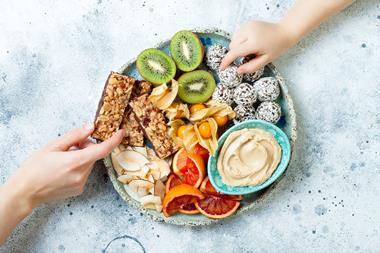Four champs discuss the gains to be made from stocking fruit and veg
Roli Ranger
Londis Ascot, Berkshire
Giving his customers high quality produce is a top priority for Roli, who ensures his staff check fruit and veg on an hourly basis to ensure that any tired items are removed from shelf and the section looks its best at all times.
Linda Williams
Broadway Premier, Edinburgh
By putting together meal solutions, such as curry ingredients and stew packs, Linda is encouraging her customers to buy more fruit and veg. She also works with schoolchildren to educate them about healthy eating.
John Perrett
Hunnyhill Spar Group, Isle of Wight
Round pound pricing works well on the pre-packed fruit and veg sold at John’s 14 stores on the Isle of Wight. He believes it a good way to give customers value for money and ensure good quality produce.
Simon Biddle
Biddles Convenience Store, Webheath, Worcestershire
Simon has raised awareness about healthy eating among school children by giving out vouchers which entitled them to a piece of fruit each. He also runs multibuy promotions to prompt sales.
Why is it important for convenience retailers to have a fruit and veg offering?
Roli: It’s important because of the high margins and because it’s now something that consumers expect. They want the choice and the availability. People are buying it on a daily basis - top-up shopping throughout the week, especially with products such as cherry and salad tomatoes.
Linda: You need to be able to offer people all the ingredients to make a meal without going to the supermarket - for example, they can’t make fajitas without the peppers and onions.
John: Fruit and veg is something that people want to buy fresh every day and it gets people into the store more frequently. They are much more aware of waste these days, so rather than buy a week’s worth of something, they’ll come to us and buy what they need for the next day or so.
Simon: If a customer is buying a pie, they’ll want carrots and cauliflower to go with it. You want people to know that they can buy everything from you.
How much space do you dedicate to fruit and veg, and how has this changed in recent times?
Roli: We’ve got a 2.5m chiller inside and two 2.5m carts outside, which each hold up to 20 wicker baskets.
Linda: We have a standalone unit for single fruits and at the moment we have a 1.5m chiller, but I’m doubling that with a new chiller in the next few weeks. I want to expand my loose fruit offering so that I can look at what’s cheap that week and buy seasonally. I want to do offers such as 10 oranges for £2. You can’t do fruit and veg properly unless you have some chilled - you can’t keep the quality up.
John: We try to give fruit and veg a fair amount of space. It varies from store to store, but in our bigger shops we’ll have three metres of chilled and a full metre of ambient fruit and veg.
Simon: We’ve got about 14m of five shelves, 60% of which is chilled. We used to have a lot more, but we reduced the percentage of fruit and veg space from 40% to 15% when we joined Simply Fresh, while keeping the same number of lines.
Where do you source your fruit and veg from?
Roli: We have a mix of pre-packed produce from Musgrave, which is displayed inside, and loose produce from Covent Garden market, which we display outside. I have a man who goes every morning to collect it for me. We can order from him any time up to midnight and can take orders for customers, too.
Linda: We have fruit and veg supplied by Booker and I go to the market twice a week. The quality is the same. We are lucky because our Booker depot is well managed. The quality is good, but they need to increase the number of lines.
John: We source all our fruit and veg through Appleby Westward. The problem with local sourcing is availability and logistics. In the UK we are used to buying all products all year round, rather than just seasonally. Being part of a buying group means you can source worldwide.
Simon: I go to the wholesale market in Birmingham three times a week, at about 4.30am. You get more of a pick of things at that time of day.
How is fruit and veg performing in your store?
Roli: In the summer, soft fruits such as peaches, nectarines, blackberries and strawberries sell well as there’s more choice. We’re up year on year and doing £2,000 a week (up from £250 a week two years ago).
Linda: Having run several healthy eating initiatives, we are up 14% year on year.
John: Sales are up 10% on last year. We’ve focused a lot on fruit and veg and put it at the front of the store where possible.
Simon: Fruit and veg sales have increased slightly, which is good when you consider how much we have reduced the sales area in the past 18 months.
How do you remain competitive on fruit and veg while maintaining a good margin?
Roli: You need to offer variety, new products when they come in season, and maintain quality. We make 33% on fruit and veg, allowing for 3% wastage.
Linda: When competing with the supermarkets it’s a balancing act. Booker Farm Fresh pricemarked packs offer us a 30% margin, while fresh produce from the local market carries a higher margin of 40-50%.
John: We rely on Appleby Westward to get us the right prices. It enables us to sell items that are either good value, or a bit different. We do a lot of £1 lines in fruit and veg. Margins are 20-30% on all pre-packed produce.
Simon: Because I buy at the wholesale market, I get produce at the best price, which enables me to compete with other stores that don’t buy that way. Aside from promotions, we are cheaper than the multiples. On some lines I’ll make 30%, and on others I’ll make 80%. It really depends on the product.
How do you increase fruit and veg sales?
Roli: I designed carts to display loose produce outside the store. Also, when strawberries are in season we will put them by the till, or next to the cream. In addition, we do multibuys on packs of peaches, strawberries and lemons to drive sales.
Linda: Our new chiller will grow sales. It will be branded with Healthier Scotland and will be filled with fruit and veg and healthy goods. We’ve also run a healthy choices breakfast initiative for 395 children. It’s a long-term project to raise awareness that we have a good range of fresh produce. Our recipe cards are very popular, too. We cost out them out so customers can see how cheap they are compared with ready meals. We also put together food solutions, with bags filled with ingredients to make curry, and stew packs of turnips, carrots and an onion for £1.39.
John: As well as putting fruit and veg at the front of the store, we’ve found it works well located near the meat. In the past we have done Change for Life projects with local schools. We invited school kids in and spoke to them about fruit and veg and the teachers followed it up in class.
Simon: We run special deals, such as £1.25 for a punnet of strawberries, or two for £2. I am thinking about introducing meal deals, too, with potatoes, carrots and beans in a bag that you get free when you buy a steak and ale pie. We’ve also done a healthy eating initiative with two schools - we gave vouchers for the kids to have a free piece of fruit.
How important is it to get the right quality of the fruit and veg?
Roli: Quality control happens on delivery - if something isn’t right then we’ll send it back. That’s one of the advantages of buying from an independent supplier. We need the best quality as people don’t quibble over pricing if the quality is there. Someone checks on the produce every hour as you don’t want tired-looking stuff. If it’s not up to scratch they’ll doubt the quality of the whole shop.
Linda: The quality of the produce is really important. We check it every morning. If our produce isn’t up to par people won’t buy it.
John: Quality is very important. The customer has to have confidence that they can take it home and it will last, so you need to check it daily, and if in doubt throw it out. You can’t stack it too high either or it will bruise.
Simon: You must have good quality produce. I’m always on at staff to take anything not looking good off the shelf.
What would your advice be to retailers who are reluctant to stock fruit and veg?
Roli: You have to be bold - the major concern is wastage, but you have to persevere. Often if you speak to your wholesaler, they will cover your wastage for two to three months. You have to be persistent and keep it going for at least three months.
Linda: It’s not easy, but you’ve got to try it. Customers expect it, and when your competition is M-Local, Sainsbury’s Local and Tesco Express, it’s a necessity.
John: You need to dive in and give it a go, but you must be prepared to stock a reasonable range, and it will take a few weeks for customers to become aware of it. It’s no good laying it all out and then being disappointed if it doesn’t sell straight away.
Simon: Give it a go and persevere with wastage. Keep your shelves looking good and give it a few months to take off.
What are your best-sellers and have there been any surprise hits?
Roli: At the moment it’s strawberries and asparagus. We’ve also had a species of cauliflower that looked space age! We didn’t think it would do well, but people really liked it.
Linda: Tomatoes, potatoes and bananas are our best-sellers, and a four-pack of pears from Kerry at £1.29 does well. A 250g pack of cauliflower and broccoli florets has been a hit.
John: All the basics - tomatoes, cucumbers, onions, potatoes and bananas - are good sellers. In the summer months, soft seasonal fruits such as strawberries, nectarines and peaches do well.
Simon: Bananas and potatoes are good sellers, and strawberries are doing well at the moment.
Do you stock loose, pre-packed or both?
Roli: We have a mix of pre-packed £1 value products through Musgrave and then loose stock from the market, which we display outside the store.
Linda: We sell both. Young mums tend to buy pre-packed as they’re used to it in the supermarkets. Older people buy loose products as they can’t use up the packs without it going off.
John: We have experimented with loose, but without doubt our customers prefer pre-packed. They don’t want to be muddying their hands picking up potatoes, and don’t want to take the time filling up plastic bags with goods.
Simon: As I wholesale fruit and veg to local firms I have a sealing and labelling machine, so we’ll pre-pack certain items ourselves, but sell the majority loose.




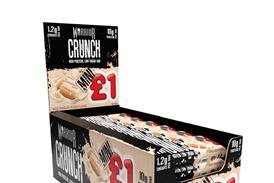










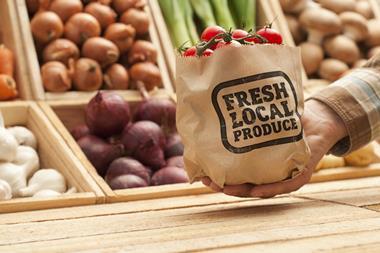
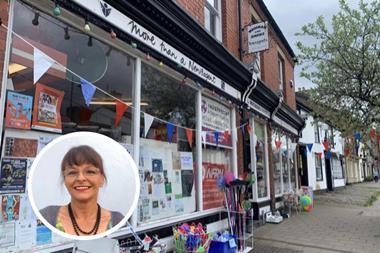
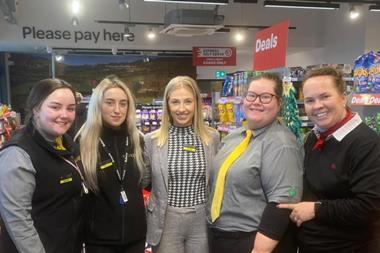
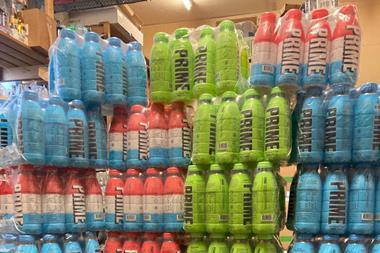

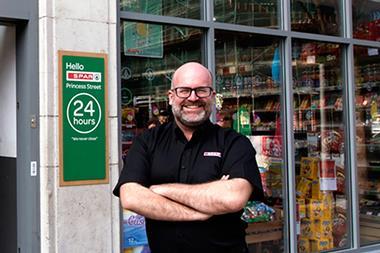
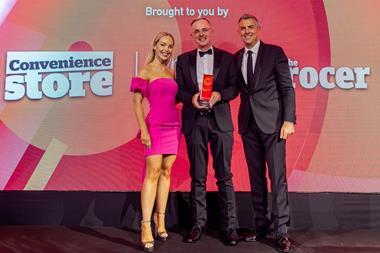
![C-Store_Champions_logo-CHOSEN[1] 2023](https://d2dyh47stel7w4.cloudfront.net/Pictures/380x253/6/5/7/301657_cstore_champions_logochosen12023_817064.jpg)

